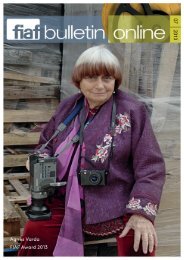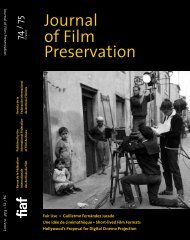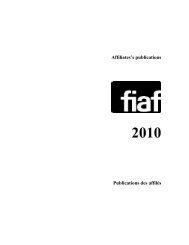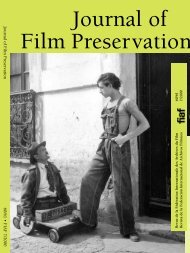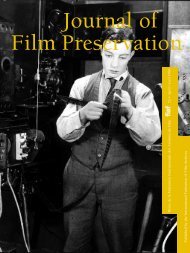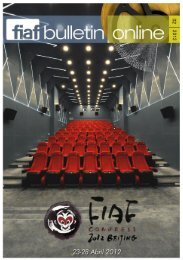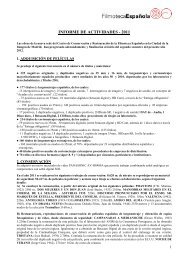Journal of Film Preservation - FIAF
Journal of Film Preservation - FIAF
Journal of Film Preservation - FIAF
You also want an ePaper? Increase the reach of your titles
YUMPU automatically turns print PDFs into web optimized ePapers that Google loves.
into the plot are as prostitutes or as paid-brigands who ineffectually<br />
attack Gary Cooper.<br />
Thus, Sternberg’s depiction <strong>of</strong> Moroccan society is not exactly<br />
sensitive or sympathetic. It is, however, picturesque, and since this<br />
particular director has never been accused <strong>of</strong> an interest in social<br />
commentary, his respectful visualization <strong>of</strong> the otherness <strong>of</strong> Morocco<br />
may be vindication in itself. As Sternberg sumptuously stylized the<br />
Chinese Revolution in Shanghai Express, his ravishingly ersatz<br />
Morocco, his heartfelt vision <strong>of</strong> its culture, compensates for its geopolitical<br />
superficiality with its baring <strong>of</strong> the director’s artistic soul. In<br />
Sternberg’s defense, too, it must be stated that rarely has Hollywood<br />
so lavishly tried to create the illusion <strong>of</strong> an authentic colonial culture<br />
as it did with Morocco. In fact, in a recent advertisement in “The New<br />
York Times”, paid for by the Moroccan government, the following<br />
quote appeared in tribute to the power <strong>of</strong> Sternberg’s vision:<br />
“Representatives <strong>of</strong> Morocco’s tourism industry hope that visitors will<br />
be seduced, just as Gary Cooper was, and will want to return again<br />
and again to this country filled with unforgettable landscapes and<br />
engaging people.”<br />
Although it can be said with legitimacy that Morocco reinforces<br />
colonialist stereotypes, I think it can also be argued that, as with<br />
Murnau’s experience in Polynesia and the early German explorers in<br />
Central Africa, Sternberg’s film opens up the possibility that a non-<br />
Western view <strong>of</strong> reality, a different system <strong>of</strong> values, may be more<br />
appealing and fulfilling than those imported by the imperial powers.<br />
By using all the elements <strong>of</strong> his illusion-making craft at the height <strong>of</strong><br />
his artistic inspiration, Josef von Sternberg has created a Morocco in<br />
which it is possible to believe that a European woman would give<br />
into her suppressed emotions and violate all conventions <strong>of</strong> sociallyaccepted<br />
behavior. Sternberg said, “the average human being lives<br />
behind an impenetrable veil and will disclose his deep emotions only<br />
in a crisis which robs him <strong>of</strong> control.” The crisis precipitated by<br />
Dietrich’s final awareness <strong>of</strong> the depths <strong>of</strong> Cooper’s feelings for her<br />
comes in the context <strong>of</strong> the atmosphere that the director has<br />
painstakingly created throughout the film. Morocco, the country, the<br />
colony, has lifted the impenetrable veil and <strong>of</strong>fered Dietrich an<br />
alternative social vision, unencumbered by European rigidity, which<br />
subverts her preconceived values and those <strong>of</strong> the audience.<br />
Although it may not have been part <strong>of</strong> Sternberg’s intended agenda,<br />
the film brings into strong question any suggestion that the Western<br />
colonial powers have all the answers, either for the subjugated<br />
countries or, indeed, for themselves.<br />
54 <strong>Journal</strong> <strong>of</strong> <strong>Film</strong> <strong>Preservation</strong> / 63 / 2001



